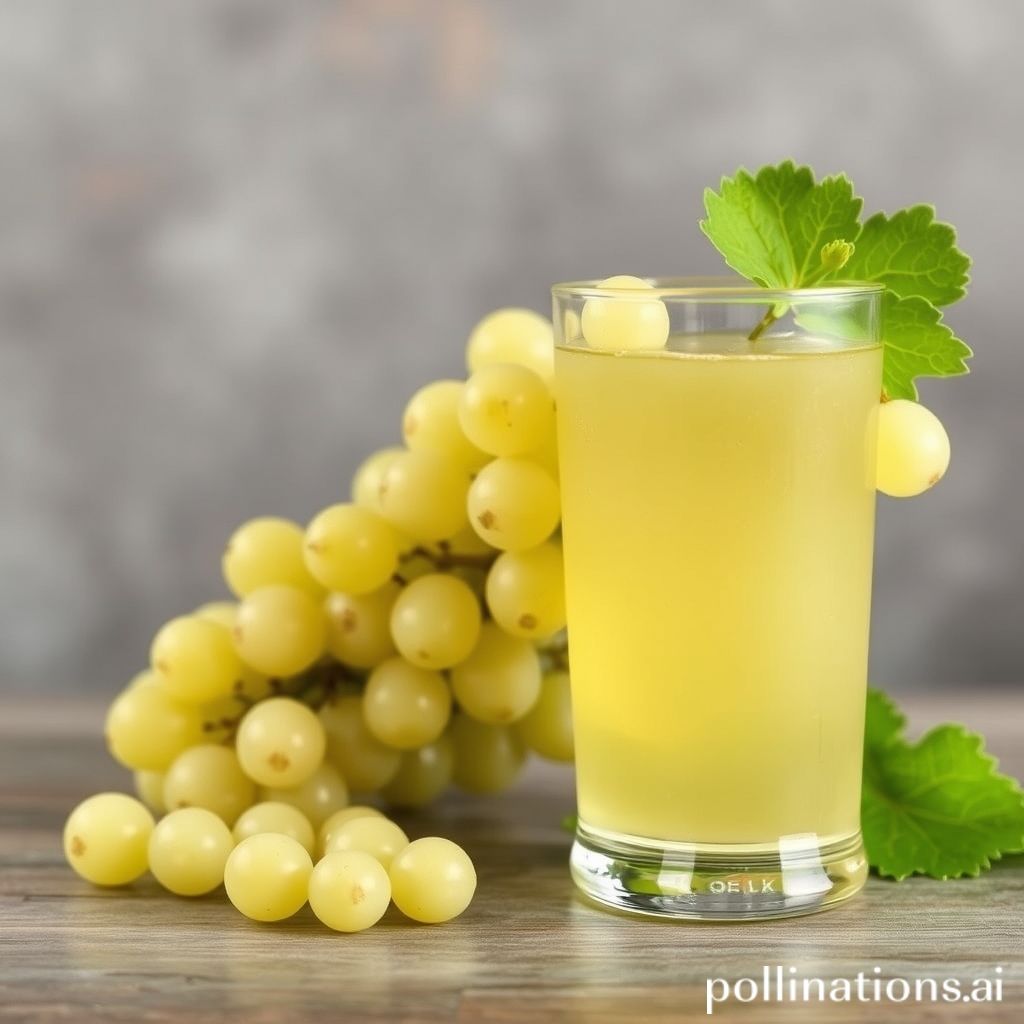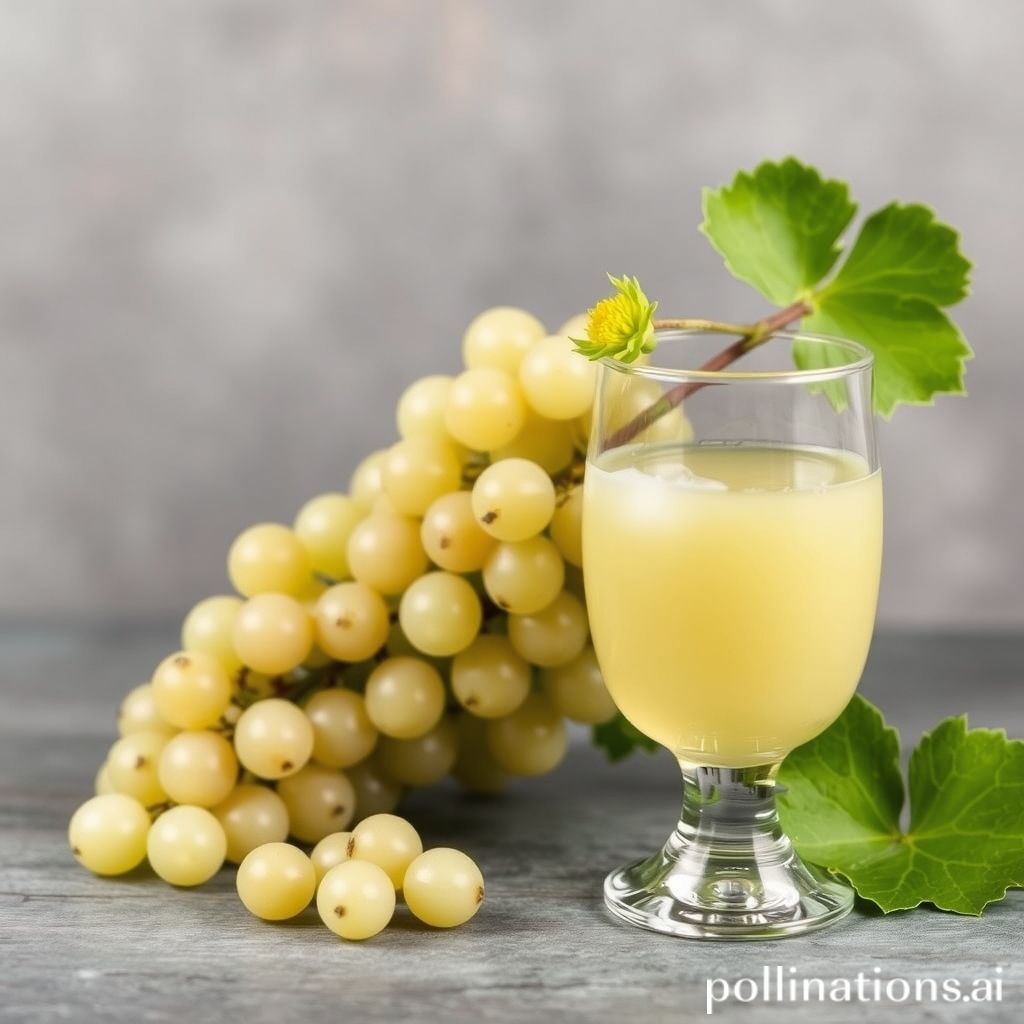Is White Grape Juice Acidic?
[su_note note_color=”#fb8e00″ text_color=”#000000″ radius=”12″]
Get a refreshing start to your day or indulge in a revitalizing afternoon pick-me-up with our selection of delicious smoothie recipes and nutritious juices. Whether you’re in a rush to kickstart your morning or in need of a refreshing boost after a walk or workout, our blender drinks are the perfect solution.
Say goodbye to sugary snacks and hello to a guilt-free, filling treat that will satisfy your cravings. Explore our wide range of smoothie and juice recipes that not only taste great but also offer incredible health benefits. From cooling tropical slushies for those hot summer days to raw vegan green smoothies and trendy ingredient blends, we’ve got you covered. Discover the goodness of our White Grape Juice and its acidity level.
[su_box title=”
[/su_box]

What is White Grape Juice?
White grape juice is a popular drink made from the juice of white grapes. It is a tasty and refreshing beverage enjoyed by people of all ages. White grape juice is known for its sweet and tangy flavor, making it a great choice for those who prefer a less acidic taste compared to other fruit juices.
1. Composition of White Grape Juice
White grape juice contains a variety of vitamins, minerals, and antioxidants. It is packed with vitamin C, which is essential for boosting the immune system and promoting overall health. It also contains potassium, which helps regulate blood pressure, and antioxidants that protect the body against harmful free radicals.
In addition, white grape juice is a natural source of sugars, providing a quick energy boost. It is low in fat and cholesterol, making it a healthier alternative to sugary drinks or sodas.
2. Production of White Grape Juice
The production process of white grape juice involves several steps to ensure its quality and taste. First, ripe white grapes are harvested from vineyards and thoroughly cleaned to remove any impurities.
After cleaning, the grapes are crushed to extract their juice. The juice is then filtered to remove any solids or particles, resulting in a clear and smooth liquid. Some manufacturers may choose to add a small amount of sugar or other natural sweeteners to enhance the juice’s flavor.
Once the juice is ready, it undergoes pasteurization to extend its shelf life and ensure its safety for consumption. Pasteurization involves heating the juice to eliminate any harmful bacteria or microorganisms. The juice is then packaged in bottles or cartons and ready to be enjoyed.
[su_highlight background=”#f6b40f”]Discover the benefits of White Grape Juice – packed with vitamins, minerals, and antioxidants for a healthier choice![/su_highlight]
Acidity Levels of White Grape Juice
White grape juice offers a refreshing taste and natural sweetness. Albeit, it’s crucial to know the acidity levels of this popular beverage. In this section, we’ll explore the pH scale and factors that can affect the acidity in white grape juice.
1. pH Scale and Acidity Levels
The pH scale measures acidity or alkalinity in a substance, ranging from 0 to 14. A pH value of 7 is neutral, Meanwhile values below 7 indicate acidity and values above 7 indicate alkalinity. In the case of white grape juice, the acidity levels can vary.
2. Factors Affecting Acidity in White Grape Juice
Several factors influence the acidity levels in white grape juice. These factors include:
- Grape Varieties: Different grape varieties have varying acidity levels. Some varieties, like Sauvignon Blanc, are known for their higher acidity, Meanwhile others may be more moderate.
- Ripeness: The ripeness of the grapes during juice extraction can impact acidity. Grapes harvested earlier tend to have higher acidity levels.
- Processing Methods: The processing methods used to make white grape juice can also affect acidity. Factors such as fermentation or the addition of acids can alter the overall acidity of the juice.
Absorbing the acidity levels of white grape juice is helpful for individuals with specific dietary needs or preferences. Whether you prefer a more acidic or less acidic juice, knowing the factors that contribute to acidity can guide your choices.
| Acidity Level | pH Range |
|---|---|
| Low Acidity | pH above 3.5 |
| Moderate Acidity | pH 3.0-3.5 |
| High Acidity | pH below 3.0 |
When enjoying white grape juice, remember that personal taste preferences may vary. Some individuals may prefer a more acidic juice, Meanwhile others may opt for a less acidic option. Ultimately, the choice is yours!
Health Benefits of White Grape Juice
-
Benefits of Antioxidants
-
Vitamins in White Grape Juice
-
Improving Digestion
White grape juice offers many health benefits that make it a refreshing and nutritious choice. Let’s explore some of its key advantages:
1. Benefits of Antioxidants
White grape juice is packed with antioxidants, which help protect the body against harmful free radicals. These antioxidant compounds, like resveratrol and flavonoids, have been linked to a reduced risk of chronic diseases, like heart disease and certain types of cancer.
2. Vitamins in White Grape Juice
Enjoying a glass of white grape juice provides a boost of essential vitamins. It is particularly high in vitamin C, which supports a healthy immune system and promotes collagen production for healthy skin. Additionally, white grape juice contains vitamin K, which is important for blood clotting and bone health.
3. Improving Digestion
White grape juice contains natural sugars and fiber that can aid in digestion. The fiber helps regulate bowel movements and promotes a healthy digestive system. Additionally, the juice’s natural acidity can stimulate the production of digestive enzymes, enhancing the breakdown of food and absorption of nutrients.
Incorporating white grape juice into your diet can provide a range of health benefits, from boosting your antioxidant intake to supporting digestion. Enjoy its delicious taste During reaping the rewards of its nutritional value.

Potential Side Effects of White Grape Juice
1. Dental Health
White grape juice, like other fruit juices, can have negative impacts on dental health. The natural sugars in the juice can contribute to tooth decay and cavities if consumed excessively. It is essential to maintain good oral hygiene and limit the intake of sugary beverages to preserve dental health.
2. Sugar Content
White grape juice contains a significant amount of sugar. In the course of the natural sugars in the juice may be healthier than added sugars found in other drinks, it is still important to consume it in moderation. Excessive sugar consumption can result in weight gain, an increased risk of diabetes, and other health problems. It is advisable to choose whole grapes or other fruits as a healthier alternative to white grape juice.
| Information |
|---|
| White grape juice can negatively impact dental health. |
| Excessive consumption of white grape juice can lead to weight gain and an increased risk of diabetes. |
[su_note note_color=”#ea2e0c” text_color=”#ffffff” radius=”8″]Extra Tip: Limit your intake of white grape juice to preserve dental health and avoid potential side effects such as weight gain and an increased risk of diabetes.[/su_note]
How to Determine the Tartness of White Grape Juice?
White grape juice is a popular drink known for its refreshing flavor and numerous health advantages. In contrast, determining its tartness level is crucial for those with specific dietary needs or who simply want to understand the characteristics of the juice they consume. There are several testing methods available to assess the tartness of white grape juice, each providing valuable insights into its composition and flavor profile.
1. Testing Methods:
There are various methods to test the tartness of white grape juice, including:
- Titration: This method involves using a chemical indicator to measure the concentration of acid in the juice. By adding a base solution drop by drop until the indicator changes color, the tartness level can be determined.
- pH Testing: pH strips or meters can be used to measure the pH level of the juice directly. A lower pH value indicates higher tartness, At the same time a higher pH value signifies lower tartness.
- Sensory Evaluation: Experienced tasters can assess the tartness of white grape juice through their sensory perception. This method takes into account factors such as taste, tanginess, and mouthfeel.
2. Interpreting Results:
Once the tartness of white grape juice has been determined, interpreting the results is essential for understanding its flavor characteristics:
- Low Tartness: White grape juice with low tartness tends to have a smoother and milder taste. It may be preferred by individuals who are sensitive to highly tart beverages.
- Moderate Tartness: Moderately tart white grape juice strikes a balance between sweetness and tanginess, offering a pleasant and refreshing flavor profile.
- High Tartness: White grape juice with high tartness can deliver a tangy and vibrant taste. It is often favored for its zesty and invigorating qualities.
Perceiving the tartness of white grape juice empowers consumers to make informed choices based on their personal preferences and dietary requirements. Whether enjoying a glass on its own, using it as a mixer, or incorporating it into recipes, knowing the tartness level adds an extra layer of knowledge to enhance the overall experience.
Conclusion
White grape juice is a popular beverage known for its refreshing taste and numerous health benefits. During white grape juice may contain some acidity, it is generally considered to be a mild and less acidic option compared to other fruit juices.
Its natural sweetness, combined with its low acidity, makes it a suitable choice for those with sensitive stomachs or acid reflux. Additionally, the antioxidants present in white grape juice can help boost the immune system and protect against certain diseases. So, whether you’re enjoying a glass of white grape juice on its own or using it as a base for cocktails or desserts, you can savor its delicious flavor without worrying about excessive acidity.
Faq about White Grape Juice:
FAQ 1: Is white grape juice acidic?
White grape juice is mildly acidic, with a pH level of around 3.3 to 3.8. In contrast, it is still considered less acidic compared to other citrus juices.
FAQ 2: Can white grape juice cause tooth decay?
Like any sugary beverage, excessive consumption of white grape juice can contribute to tooth decay if proper oral hygiene is not maintained. It is recommended to drink white grape juice in moderation and brush teeth afterwards.
FAQ 3: Is white grape juice high in sugar?
White grape juice naturally contains sugar from the grapes. Meanwhile it is not as high in sugar as some other fruit juices, it is still important to consume it in moderation, especially for individuals with diabetes or those watching their sugar intake.
FAQ 4: How can white grape juice benefit digestion?
White grape juice contains natural enzymes that can aid in digestion. These enzymes help break down food particles and promote better absorption of nutrients. It can be beneficial for individuals with digestive issues, but it is always recommended to consult a healthcare professional for personalized advice.
FAQ 5: Can white grape juice be consumed by people with vitamin deficiencies?
White grape juice is a good source of vitamin C, which can help boost the immune system and promote overall health. In contrast, it should not be solely relied upon to treat vitamin deficiencies. It is best to maintain a balanced diet and consult a healthcare professional for appropriate vitamin supplementation.
Read Similar Post:
1. Grape Juice: The Natural Remedy for Constipation
2. Unlock the Secret: Does Grape Juice Act as a Natural Laxative?
